Categories
Change Password!
Reset Password!


The effectiveness of triple vs. quadruple treatment for Helicobacter pylori (H. pylori) elimination was compared by a systematic review and meta-analysis of randomized clinical trials (RCTs).
As a first-line treatment for H. pylori disease, quadruple therapy has superior efficacy than triple therapy. But, in the second-line treatment, the efficacy of both regimens is almost comparable.
The effectiveness of triple vs. quadruple treatment for Helicobacter pylori (H. pylori) elimination was compared by a systematic review and meta-analysis of randomized clinical trials (RCTs).
Electronic and manual searches of national and international web databases (Scopus, PubMed, Embase, Magiran, and IsI) were explored for searching RCTs including triple and quadruple treatment. For pooling analysis, the random-effects model was utilized. For determination of publication bias, the Egger test and funnel plots were utilized.
A total of 79 RCTs were incorporated in the meta-analysis after a thorough examination of the selected publications; it was based on the use of triple and quadruple therapy as the first and second-line treatment. According to the findings, triple therapy had a lower eradication rate than quadruple therapy in the first-line setting. Table 1 depicts the H. pylori elimination rate of quadruple and triple therapy in per-protocol (PP) and intention-to-treat (ITT) analysis.

Quadruple treatment was more successful for 7 or 10 days. In the Asian population, the efficacy of quadruple therapy was noted to be slightly more when compared to triple therapy, while this difference was significantly more in the European population.
Quadruple therapy is more successful than triple therapy for H. pylori eradication as a first-line therapy; nevertheless, as a second-line therapy, the efficacy of the two regimens is almost comparable.
Current Reviews in Clinical and Experimental Pharmacology
Novel Information Regarding the Treatment of Helicobacter pylori Infection: A Systematic Review and Meta-analysis of Randomized Clinical Trials
Faezeh Kiani et al.
Comments (0)